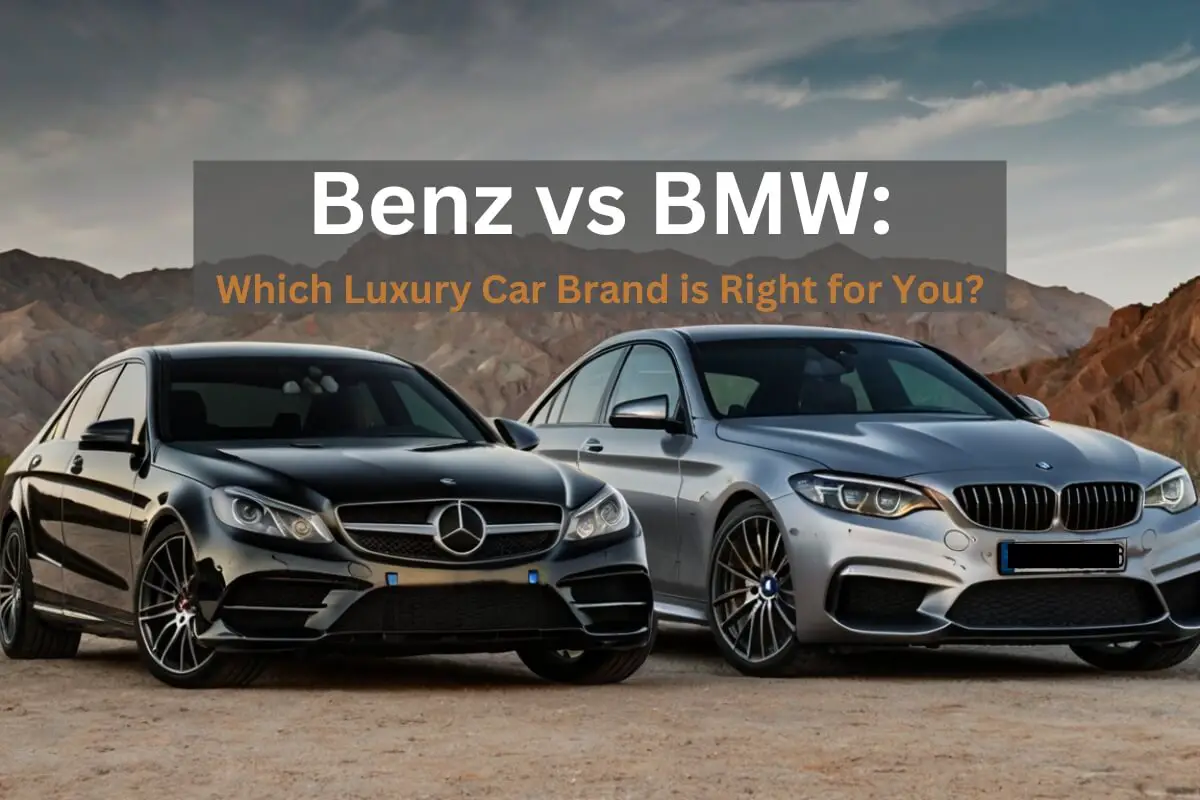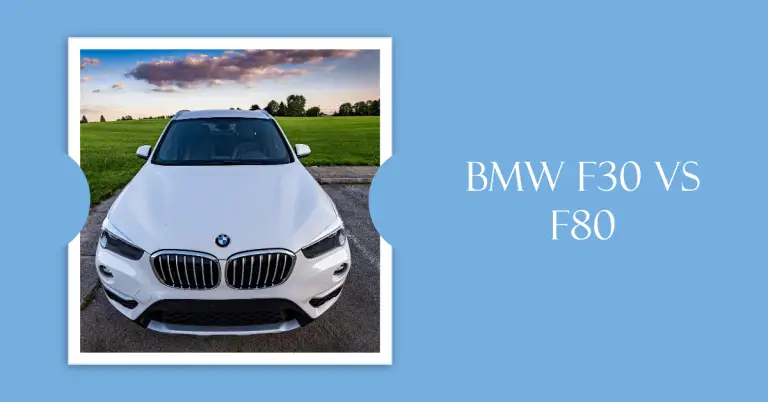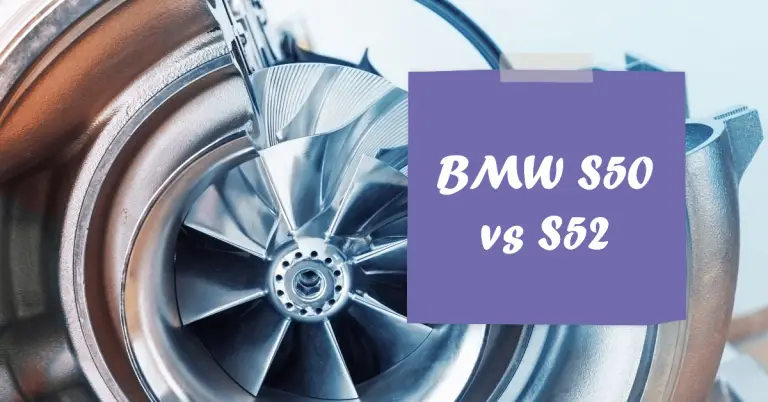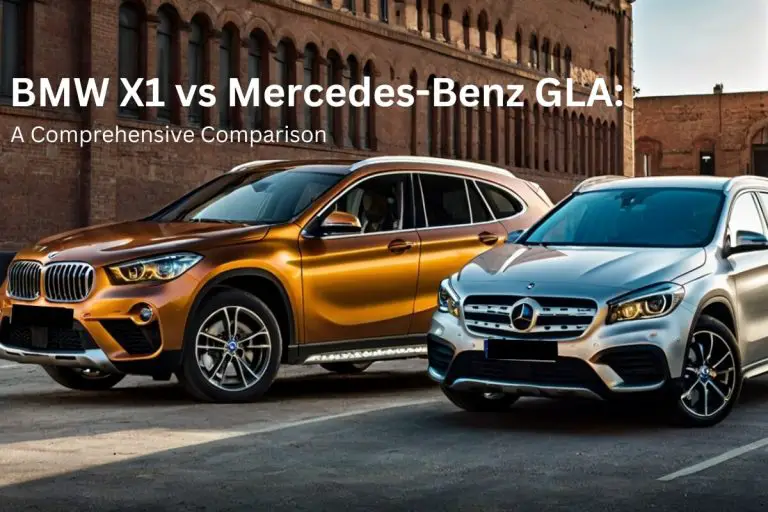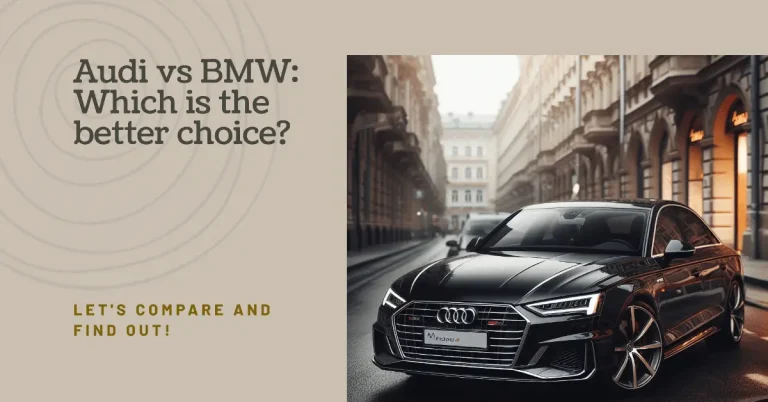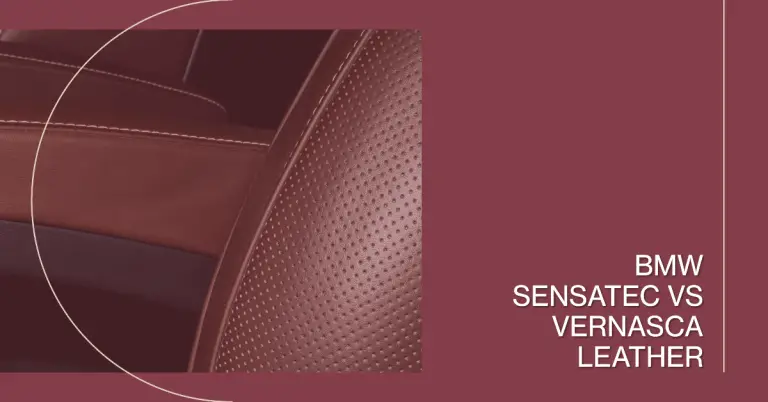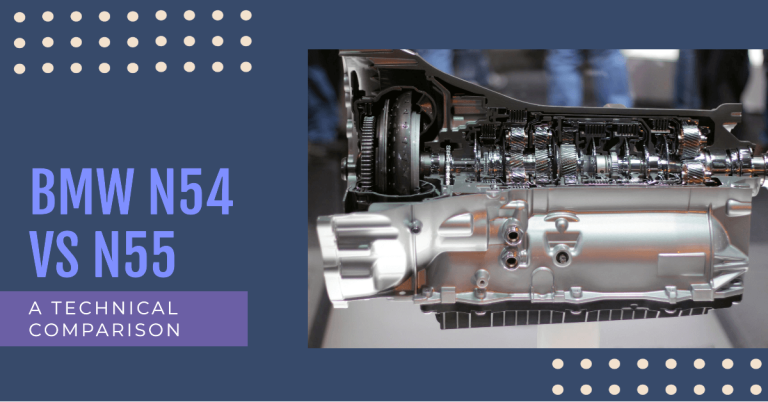Benz vs BMW: Which Luxury Car Brand is Right for You?
For decades, Mercedes-Benz and BMW have been synonymous with luxury, performance, and prestige in the automotive world. These two German giants have captivated car enthusiasts and discerning buyers alike with their cutting-edge engineering, sleek designs, and unwavering commitment to quality. However, when it comes to choosing between these two iconic brands, the decision can be a daunting task.
So, which luxury car brand should you choose – Benz or BMW?
The answer lies in your personal preferences, lifestyle, and driving style. While both brands offer exceptional vehicles, they have distinct strengths and traits that cater to different types of buyers.
In this comprehensive article, we’ll delve into the nuances that separate Mercedes-Benz and BMW, exploring their histories, design philosophies, performance characteristics, interior comforts, technological innovations, pricing strategies, and model lineups. By the end, you’ll have a better understanding of which brand aligns more closely with your automotive needs and desires.
A Tale of Two Legacies: Brand History and Reputation
Before we dive into the nitty-gritty details, let’s take a moment to appreciate the storied histories of these automotive giants.
Mercedes-Benz: A Symbol of Luxury and Innovation
Founded in 1886, Mercedes-Benz has been at the forefront of automotive innovation for over a century. From pioneering the first gasoline-powered automobile to introducing groundbreaking safety features like crumple zones and anti-lock brakes, the brand has consistently pushed the boundaries of what’s possible in the automotive industry.
Over the years, Mercedes-Benz has cultivated a reputation for delivering unparalleled luxury, comfort, and refinement. Their vehicles exude a sense of exclusivity and prestige, catering to those who appreciate the finer things in life.
BMW: The Ultimate Driving Machine
Established in 1916, BMW (Bayerische Motoren Werke) has its roots in aircraft engine manufacturing. However, it wasn’t until after World War II that the company shifted its focus to building automobiles, and the rest, as they say, is history.
BMW’s tagline, “The Ultimate Driving Machine,” encapsulates the brand’s core philosophy – delivering an exhilarating and engaging driving experience. From the iconic 3 Series to the high-performance M division, BMW has earned a reputation for creating vehicles that prioritize driving dynamics and agility.
Design and Styling: Elegance Meets Sportiness
One of the most visible distinctions between Mercedes-Benz and BMW lies in their design languages and styling cues.
Mercedes-Benz: Elegant and Refined
Mercedes-Benz vehicles are renowned for their elegant and refined styling, characterized by smooth curves and contours. The brand’s design philosophy emphasizes sophistication and timeless beauty, with each model exuding a sense of luxury and prestige.
From the iconic Mercedes-Benz grille to the sleek lines and flowing silhouettes, the brand’s design language is a perfect blend of form and function, creating a visual harmony that captivates the senses.
BMW: Sporty and Aggressive
In contrast, BMW’s design language leans towards a more aggressive and sporty aesthetic. The brand’s vehicles feature sharp lines, bold angles, and muscular proportions, evoking a sense of dynamism and athleticism.
The iconic kidney grille, sculpted body lines, and distinctive Hofmeister kink (the upward bend in the C-pillar) are instantly recognizable design cues that have become synonymous with BMW’s performance-oriented ethos.
Performance and Driving Dynamics: Balancing Power and Precision
When it comes to performance and driving dynamics, both Mercedes-Benz and BMW offer a range of powerful and capable vehicles, catering to different driving preferences.
Mercedes-Benz: Powerful and Refined
Mercedes-Benz vehicles are known for their potent engines and smooth handling characteristics. From the muscular AMG models to the luxurious S-Class sedans, Mercedes-Benz prioritizes delivering a refined and comfortable driving experience without sacrificing power.
The brand’s engines are often larger and more powerful, providing effortless acceleration and a sense of authority on the road. However, Mercedes-Benz’s focus on comfort and luxury ensures that the driving experience remains composed and well-mannered, even at high speeds.
BMW: Agile and Engaging
BMW, on the other hand, is renowned for its agile handling and precision engineering. The brand’s vehicles are designed to provide an engaging and involving driving experience, with a focus on delivering razor-sharp dynamics and responsiveness.
BMW’s engines, while often smaller in displacement than their Mercedes-Benz counterparts, are tuned for performance and efficiency. The brand’s commitment to lightweight construction and advanced suspension technologies ensures that BMW vehicles feel nimble and communicative, allowing drivers to extract every ounce of performance from the vehicle.
Interior and Comfort: Luxury and Ergonomics
While performance and styling are crucial factors, the interior experience is equally important when it comes to luxury vehicles. Both Mercedes-Benz and BMW have their own distinct approaches to cabin design and comfort.
Mercedes-Benz: Opulent and Luxurious
Step inside a Mercedes-Benz, and you’ll be greeted by an interior that exudes opulence and luxury. From the premium materials and attention to detail to the plush seating and advanced amenities, Mercedes-Benz cabins are designed to provide a sanctuary of comfort and refinement.
The brand’s interiors are characterized by high-quality leather upholstery, real wood trim, and meticulous craftsmanship, creating an atmosphere of sophistication and elegance. Additionally, Mercedes-Benz vehicles offer a wide range of customization options, allowing owners to tailor their interior to their personal preferences.
BMW: Driver-Focused and Ergonomic
While BMW interiors are undoubtedly luxurious, the brand’s focus on driver-centric design and ergonomics is evident. BMW cabins are designed to enhance the driving experience, with a emphasis on intuitive controls and optimized seating positions.
The brand’s interiors feature a clean and minimalist aesthetic, with a focus on functionality and ease of use. High-quality materials and attention to detail are still present, but the overall design is geared towards creating a comfortable and focused environment for the driver.
Technology and Features
In the modern automotive landscape, technology and features play a crucial role in enhancing the driving experience and providing convenience. Both Mercedes-Benz and BMW are at the forefront of technological innovation, offering a wide range of advanced systems and features.
Mercedes-Benz: Cutting-Edge Infotainment and Safety
Mercedes-Benz has consistently pushed the boundaries of automotive technology, introducing innovative features that prioritize safety, convenience, and connectivity.
The brand’s MBUX (Mercedes-Benz User Experience) infotainment system is a prime example of their technological prowess. Powered by artificial intelligence and natural language processing, MBUX offers a seamless and intuitive interface for controlling various vehicle functions, including navigation, entertainment, and climate control.
Additionally, Mercedes-Benz vehicles are equipped with advanced safety features like Collision Prevention Assist, Attention Assist, and Pre-Safe, which employ sophisticated sensors and algorithms to help prevent accidents and protect occupants in the event of a collision.
BMW: Intelligent Driver Assistance and Connectivity
BMW’s approach to technology focuses on enhancing the driving experience and providing intelligent driver assistance features.
The brand’s iDrive infotainment system is widely regarded as one of the most user-friendly and intuitive systems on the market. With its sleek interface, voice control capabilities, and seamless integration with smartphones, iDrive provides a comprehensive suite of connectivity and entertainment options.
BMW vehicles also boast an array of advanced driver assistance systems, such as Lane Departure Warning, Frontal Collision Warning, and Pedestrian Detection. These features work in tandem to provide an extra layer of safety and peace of mind for drivers and occupants alike.
Pricing and Value: Finding the Right Balance
When it comes to luxury vehicles, pricing and value are essential considerations. Both Mercedes-Benz and BMW offer a range of models at varying price points, catering to different budgets and preferences.
Mercedes-Benz: Premium Pricing, Premium Value
Mercedes-Benz vehicles are generally positioned at the higher end of the pricing spectrum, reflecting the brand’s commitment to luxury and exclusivity. However, this premium pricing is often offset by the value proposition offered by Mercedes-Benz vehicles.
From their advanced safety features and cutting-edge technology to their opulent interiors and powerful engines, Mercedes-Benz vehicles deliver a comprehensive luxury experience that justifies their higher price tags.
BMW: Competitive Pricing, Performance-Oriented Value
While BMW vehicles are by no means inexpensive, the brand often offers slightly lower starting prices compared to their Mercedes-Benz counterparts. This competitive pricing strategy makes BMW vehicles more accessible to a wider range of buyers. However, it’s important to note that as you move up the model range and add optional features, the price gap between the two brands narrows significantly.
BMW’s value proposition lies in its emphasis on performance and driving dynamics. The brand’s vehicles are engineered to deliver an exhilarating and engaging driving experience, with a focus on agility, responsiveness, and precision handling. For driving enthusiasts and those who prioritize performance over outright luxury, BMW offers a compelling value proposition at various price points.
Model Range and Versatility: Catering to Different Lifestyles
Both Mercedes-Benz and BMW offer a diverse range of models, catering to different lifestyles and preferences. From sleek sedans and coupes to spacious SUVs and versatile wagons, these brands have something for everyone.
Mercedes-Benz: A Lineup for Luxury and Comfort
Mercedes-Benz’s model range showcases the brand’s commitment to luxury and comfort. From the compact A-Class and C-Class sedans to the flagship S-Class and the rugged G-Class SUV, Mercedes-Benz offers a diverse lineup that caters to a wide range of needs and preferences.
The brand’s SUV lineup, which includes the GLC, GLE, and GLS models, provides ample space and versatility for families and adventurers alike. Additionally, Mercedes-Benz’s lineup of high-performance AMG models, such as the AMG GT and AMG C63, cater to those seeking a perfect blend of luxury and exhilarating performance.
BMW: A Portfolio for Driving Enthusiasts
BMW’s model range is anchored by its iconic 3 Series and 5 Series sedans, which have long been regarded as the benchmark for sports sedans. However, the brand’s lineup extends far beyond these core models, offering a diverse range of vehicles that cater to driving enthusiasts.
From the compact 2 Series coupes and convertibles to the powerful X5 and X7 SUVs, BMW’s portfolio is designed to deliver an engaging and dynamic driving experience across various vehicle segments. Additionally, the brand’s high-performance M division, which includes models like the M3, M5, and X5 M, offers an uncompromising blend of performance and luxury for those seeking the ultimate driving machines.
Conclusion: The Choice is Yours
As we’ve explored, Mercedes-Benz and BMW are two automotive titans that have carved out distinct identities and strengths in the luxury car market. While both brands offer exceptional vehicles, their unique philosophies and approaches cater to different preferences and lifestyles.
If you prioritize opulent luxury, refined comfort, and a prestigious brand image, Mercedes-Benz may be the ideal choice for you. With its elegant design language, plush interiors, and cutting-edge technology, Mercedes-Benz vehicles provide a sanctuary of sophistication on the road.
On the other hand, if you’re a driving enthusiast who values agility, precision handling, and an engaging driving experience, BMW might be the better fit. With its sporty design cues, driver-focused interiors, and performance-oriented engineering, BMW vehicles offer an unparalleled sense of connection between driver and machine.
Ultimately, the decision between Mercedes-Benz and BMW comes down to your personal preferences, lifestyle, and driving style. It’s essential to test drive both brands and experience their unique characteristics firsthand before making your choice.
Remember, whether you choose the elegance of Mercedes-Benz or the sportiness of BMW, you’re investing in a luxury automotive experience that promises to deliver exceptional quality, performance, and prestige for years to come.

